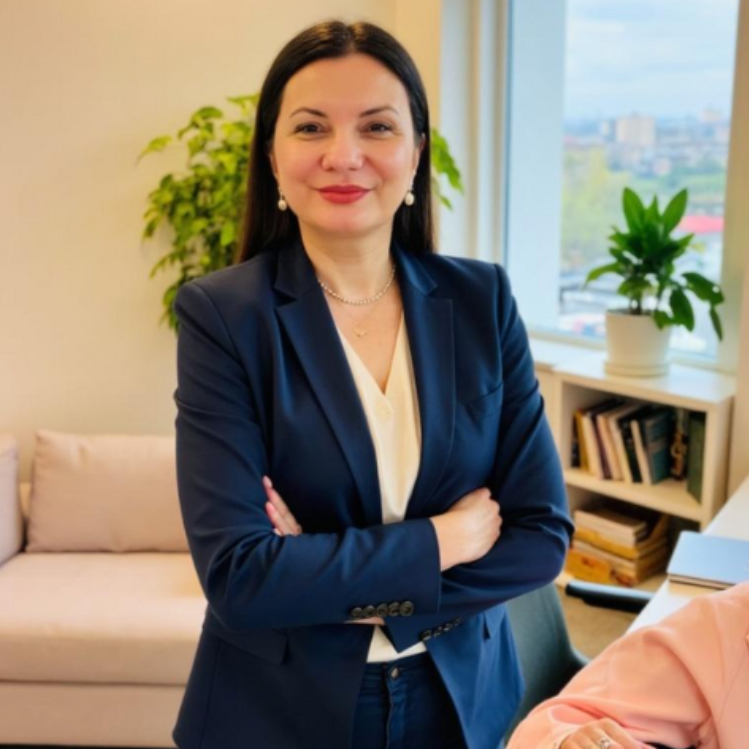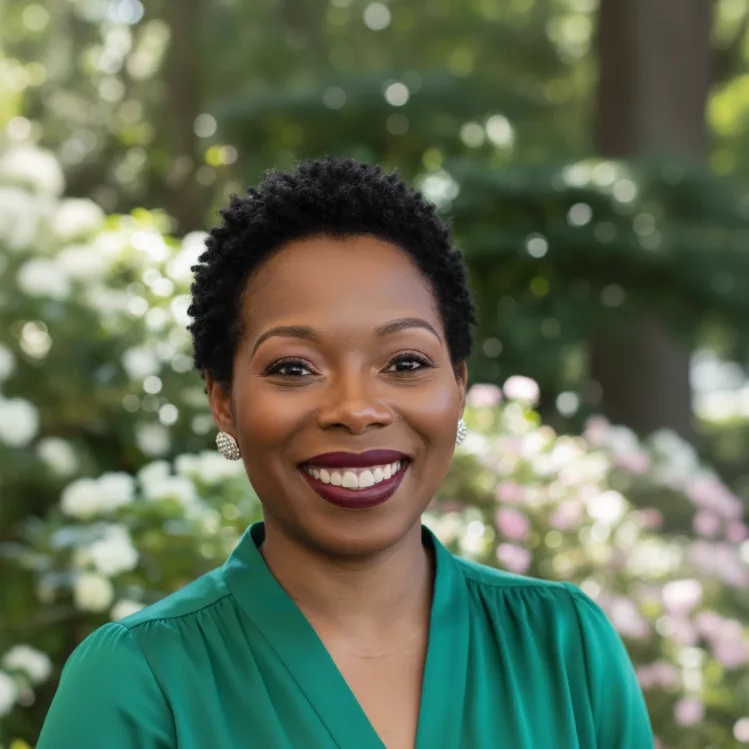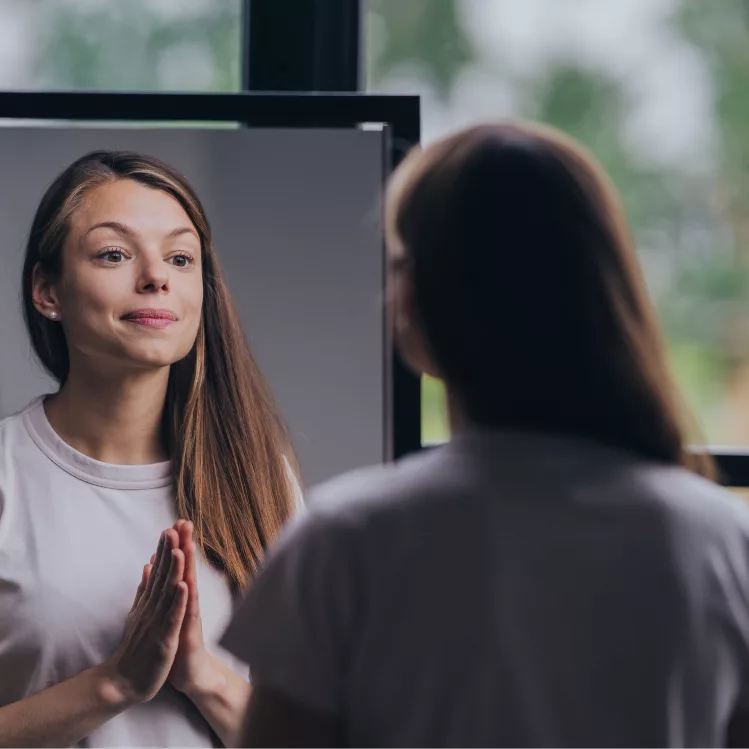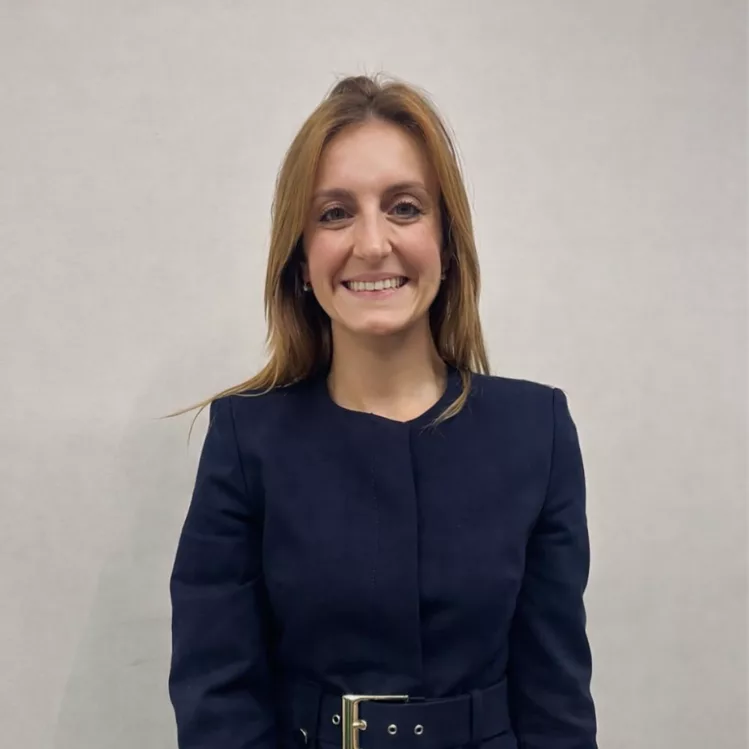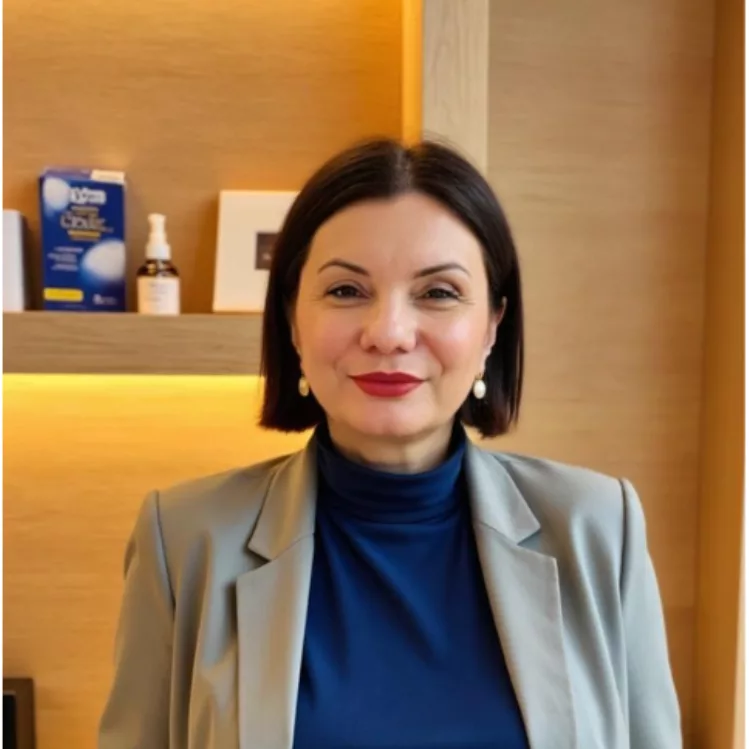
From IT Expert to Sleep Advocate: A Journey of Transformation
Born and raised in Romania, Dorina Torje arrived in Brussels at 30, a city she instantly fell in love with and never left. As a global traveler and visionary entrepreneur, Dorina has explored diverse cultures, innovative ideas, and transformative solutions.
With an impressive academic background—a Bachelor’s in Mathematics, a Bachelor’s in Computer Science, a Master’s in IT E-Commerce, and another in Diplomacy and Protocol—she built a 24-year career in IT. Over 17 years as a freelance IT consultant, she helped businesses navigate digital transformation, bridging the gap between technology and human potential. Yet, her most profound transformation came from an unexpected challenge—a 12-year battle with chronic insomnia.
With such a strong IT and digital transformation background, what inspired your transition into the world of sleep and well-being?
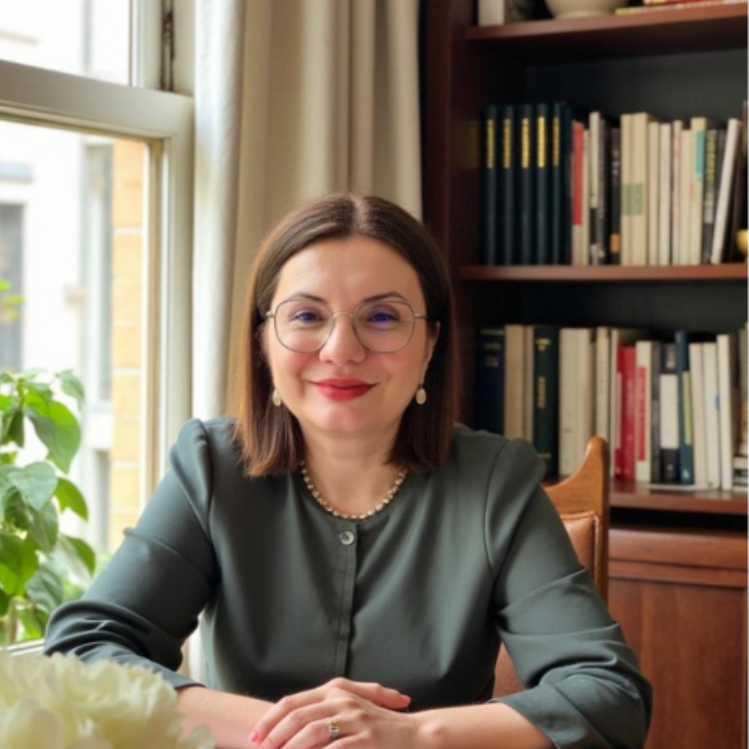
My career in IT had reached a ceiling—I felt stuck, unable to break through to the next level. At the same time, I recognized the urgent need to reskill and adapt to the rapidly evolving world of AI. It was a pivotal moment, both professionally and personally.
But amidst these career shifts, I was also experiencing the final, most dangerous stage of my 12-year struggle with insomnia. The sleeping pills I had relied on stopped working, even at triple the dose. My body had reached its limit.
It was as if the universe had aligned to force me into a full reset. I had to start from scratch, not just in my career but in my life. I became a junior again—relearning the fundamentals of AI while, at the same time, being sent home by doctors with a simple but life-altering directive: take care of yourself, and relearn how to sleep.
That moment was a wake-up call, both literal and metaphorical. But it also led me to a powerful realization: I had found my niche. Instead of learning AI in a purely theoretical way, I could apply my expertise to a real-life project—one that was deeply personal, impactful, and urgent.
And just like that, what started as a desperate need to heal became my purpose.
Many people believe that sleep issues can be solved with the right products. Why do you emphasize that true rest must be relearned?
First, I want to make it clear: I’m not a doctor or a certified sleep specialist, and I don’t claim to have all the answers. But I do have 12 years of lived experience—twelve years of believing that without sleeping pills, I wouldn’t be able to function.
In the world of IT, we train systems on specific data. They become exceptional at processing that data, but the moment we alter the input, they need time to adjust and retrain. The human brain works similarly. After years of relying on pills, my body had forgotten how to sleep naturally. The moment I removed the medication, it had to relearn—from zero.
And that process wasn’t instant. When I stopped taking sleeping pills, I spent three nights without a single minute of sleep. On the fourth night, I got one hour—just one. But that single hour was a rebirth. It was the first step in rewiring my brain and rebuilding my body’s natural ability to sleep.
Unlearning old habits, shifting paradigms, and relearning the art of sleep is the real solution—not just finding the next trendy product.
And that’s the key: sleep is a journey. Along the way, different products might provide temporary relief or support in certain stages of sleep deprivation, but they are not the solution in themselves.
For instance, I still use blinders to prevent early wake-ups caused by light exposure, and when I travel to hotels without blackout curtains, I always carry an eye mask. But neither of those will make me fall asleep or keep me asleep. Since I’m a light sleeper, I also bring earplugs to block out external noise.
Bedding essentials—like the right pillow, a cooling mattress, a humidifier, or smart lamps—can certainly improve sleep quality. A smart alarm helps me wake up at the end of a sleep cycle, ensuring I don’t feel groggy or irritable even if I haven’t reached my ideal sleep duration.
But here’s what many people don’t realize: sleep isn’t a feature you can “turn on” like adjusting settings on a phone. There is no switch-off button. You must create the space and invite sleep in. And for that to happen, two dimensions must align:
The external setup—your sleep environment, free of disruptions, optimized for rest.
The internal setup—your lifestyle, diet, exercise, mental and emotional state.
Because sleep isn’t just about physical comfort. It’s deeply connected to how we’ve evolved over the years—our mindset, habits, and even our spiritual well-being. It’s about unlearning what no longer serves us, shifting paradigms, and relearning how to surrender to sleep.
Throughout my transition, I visited a somnologist monthly. And every time, as I left his office, he’d say the same thing: “Dorina, you need to take care of yourself.”
The third time, I finally stopped and asked:
“But how? I shower, I brush my teeth, I eat. What am I missing?”
That’s when it hit me—I had spent years taking care of everyone except myself. Learning how to prioritize my well-being was the missing piece. I had to learn how to apply to myself the care I was offering naturally to others.
Of course, external factors like blackout curtains, the right pillow, or a sleep tracker can support better sleep. But no product alone will teach your body to let go and enter true rest. That requires a deeper transformation—one that includes mindset shifts, emotional regulation, and even spiritual awareness.
You’ve worked with leading sleep experts and specialists—what’s the most surprising insight you’ve learned about sleep that most people don’t know?
One of the most fascinating discoveries? Your body learns to associate your bed with sleep—just like Pavlov’s dog learned to associate a bell with food.
Early in my recovery, I had to strictly follow one rule: never sleep anywhere except my bed. No naps on the sofa. No dozing off in an armchair. This reinforced the connection between my bed and sleep, making it easier for my brain to transition into rest mode.
Another surprising insight? Good sleep doesn’t start at night—it starts in the morning.
To regulate hormones like cortisol and melatonin, you need to signal to your body when the day begins and when it ends. I started exposing my eyes to sunlight first thing in the morning, and taking cold showers to naturally spike my cortisol—helping it drop in the evening when melatonin should take over.
Yet despite all this research, many doctors still turn to one common “solution”: prescribing pills. I get it—I used them, too, because I couldn’t afford to be sleep-deprived at work. But if pills were the long-term answer, why are so many people still struggling?
What role does technology play in both disrupting and enhancing sleep, and how can we use it mindfully for better rest?
I love technology—I’ve always been an early adopter. But I also recognize that we’re playing with a double-edged sword. Technology can either support our sleep journey or completely sabotage it, depending on how we use it.
As I mentioned earlier, sleep is an ecosystem. If we want to improve it, we need to approach it holistically, considering both external and internal factors. This is where technology can become either a powerful ally or a silent disruptor.
On the positive side, I constantly explored sleep monitors and apps to track my sleep patterns and correlate them with my daily habits, emotions, and lifestyle choices. Over time, I started identifying patterns and adjusting my behaviors to optimize my sleep quality. Technology gave me data, and data gave me insights.
For circadian rhythm regulation, if someone doesn’t want to rely on natural sunlight exposure or cold showers like I did, there are now specialized lamps and light devices designed to mimic natural light cycles. Essentially, these technologies replace biological cues that modern life has disrupted.
For relaxation and stress reduction, there are devices that lower brainwave frequency, mimicking the effects of meditation—perfect for people who struggle to meditate on their own. If anxiety or an overactive nervous system is preventing sleep, there are wellness and medical devices that stimulate the vagus nerve to induce a state of calm.
If pain is the barrier to sleep, technology offers pain management solutions to ease discomfort and improve sleep quality.
But with all these tools at our disposal, the real challenge is using technology mindfully.
First, we must be educated about our sleep ecosystem and understand what we truly need. Then, we can decide which elements to automate with technology and which ones to take personal responsibility for.
For example, someone living in a region with limited daylight exposure might need artificial light therapy to maintain a healthy sleep-wake cycle. But in other cases, people might simply be looking for a shortcut to avoid lifestyle changes, like avoiding screens before bed or managing stress naturally. Technology should be a supplement, not a replacement for conscious self-care.
And while AI, apps, and smart devices can help optimize sleep, there’s one thing technology can never replace: human connection. We need to socialize, engage in real-life interactions, and not just seek all our answers through screens and algorithms.
Most importantly, some things remain our personal responsibility—movement, exercise, nutrition, eating hours, and mental discipline. No device can force you to take care of your body. And if we allow ourselves to be overstimulated by constant exposure to social media and digital content, no amount of sleep tech will save us. Digital detox is no longer optional—it’s essential.
So yes, technology can be a powerful tool in the quest for better sleep. But like any tool, it’s only as good as the person using it. The key is to use it with intention—not as an escape, but as an enhancement.
What inspired you to create NaturalSleep.shop, and how do your products go beyond traditional sleep aids?
At NaturalSleep.shop, we focus exclusively on drug-free sleep solutions. That’s why we call it “Natural.” But this wasn’t just a business idea; it was born out of my own 12-year struggle with sleeping pills.
There were many moments when I didn’t know where to even start looking for new solutions. In my desperation, I reached out to Harvard Medical School, hoping there was some groundbreaking research I hadn’t yet discovered. They responded with a list of 352 clinical trial studies worldwide. I applied to all of them. I was rejected from every single one.
Then came my wake-up call. When my somnologist sent me home with the instruction to “relearn to sleep,” he didn’t tell me to quit sleeping pills—but he did give me 30 days of medical leave. I made the decision that day: no more pills. It took me six weeks just to find a sleep therapist who spoke English and four months to get an appointment with a psychiatrist.
It took me four months to experience my first full 8-hour, drug-free sleep. I was on medical leave for five months.
And here’s what I learned:
A poor sleeper is not a consistent searcher. When you’re sleep-deprived, you Google solutions once, get overwhelmed, and give up. If you’re lucky enough to sleep well for a few nights, that’s when you start researching again. But sleep solutions are scattered everywhere—and if you don’t know something exists, how can you search for it?
That’s why I created NaturalSleep.shop.
We bring together every drug-free sleep innovation available on the market, so that when someone is in desperate need, they don’t have to endlessly Google or struggle to figure out what’s even out there. We do the research for them.
The reality is, when I was going through my worst years, none of today’s cutting-edge sleep products existed. Most sleep devices on the market today are less than three years old. But now, every day, I’m discovering innovations and forming partnerships with the brands that are leading the future of sleep technology.
And because sleep is holistic, we’re going beyond just products. This year, we launched DreamWell, a program designed for different stages of sleep deprivation:
Deep Relaxation: Spa treatments, massages, acupuncture—perfect for those needing immediate relief from stress and tension.
Mind & Body Reset: For those ready to dive deeper into the root causes of their sleep struggles. We bring in life coaches, generative embodiment specialists, ThetaHealing, and CBT-I experts.
Burnout Prevention & Sleep Optimization: We work with somnologists, sleep professionals, and burnout coaches to help people regain control of their sleep long-term.
And this is just the beginning. We plan to expand DreamWell to address other sleep disorders beyond insomnia.
At NaturalSleep.shop, we don’t just sell products—we provide guidance, education, and human support. Our mission is to make sure that no one struggling with sleep has to navigate this journey alone. We empower people to make conscious, informed choices about their sleep—because no one should have to spend 12 years searching for answers like I did.
How has your work with Global Woman Influencer helped elevate the conversation around sleep and performance?
When leaders like Elon Musk proudly claim they sleep only five hours a night—and are actively trying to sleep even less—it raises a crucial question:
👉 Is this the future we want?
AI runs on an electrical plug. Humans run on sleep.
No matter how much technology advances, we cannot override biology.
Through Global Woman, I’m working to shift the narrative—challenging outdated workplace cultures that glorify exhaustion and redefining rested as the new standard of success.
Sleep deprivation is often seen as a temporary inconvenience, but its effects go much deeper than most people realize. It impacts not just your mood and energy levels, but also your cognitive abilities, emotional resilience, and even long-term health.
For example, a sleep-deprived brain is more likely to misinterpret emotions, making social interactions harder. You might find yourself overreacting to small issues or feeling more anxious than usual. Decision-making, creativity, and even basic problem-solving skills take a hit—which is why sleep deprivation is linked to poor workplace performance.
But beyond the individual consequences, there’s a systemic issue that often goes unnoticed: the bias toward morning chronotypes.
In many workplaces, morning people are still perceived as more productive, disciplined, and responsible. They are often rated higher in performance reviews simply because their natural rhythm aligns with traditional work hours. Night owls, on the other hand, are at a disadvantage—regardless of their actual output.
This is a cultural and structural problem that needs to be addressed. We need to rethink how we define productivity and performance in a way that acknowledges and respects individual sleep chronotypes. You can’t be serious about DEI, if you did not include chronodiversity as part of your strategy.
And yet, despite all of this, we still live in a society that glorifies sleep deprivation. “I’ll sleep when I’m dead” is still a common mindset—when in reality, the less you sleep, the closer you bring yourself to burnout and long-term health issues.
The good news? Many of these negative effects can be reversed with proper sleep hygiene and a shift in how we approach rest as a society. It starts with awareness, education, and changing the way we structure work and daily life to support natural sleep patterns rather than punish them.
If you could give one piece of advice to people who want to improve their sleep starting today, what would it be?
I’m a private person, but I share my story because I want to remind people:
✨ Change is possible.
✨ Healing is possible.
✨ Restorative sleep is possible.
I am living proof. This year in April, I am celebrating my full year of drug-free restorative sleep.
As said, I am not an authority to give specialized advice, but if you take one thing from this, let it be this:
Learn to take care of yourself. Prioritize sleep. Make it non-negotiable.
Your future self will thank you.
